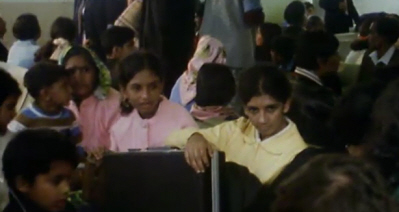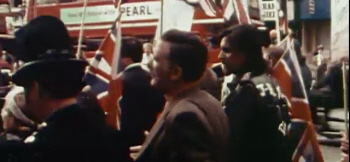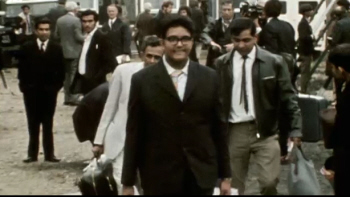Ugandan Refugees
Displaced Asians
In the late summer of 1972, one group of British citizens were arriving from sunnier climes. They weren't back from happy holidays.
They were exiles from their native land. Frightened Asian families from Uganda were seeking shelter in
Britain. And they would test just how much attitudes had really changed.
In Uganda the Asian communities had been wealthy, successful and influential, until the arrival of a man made in Britain,
General Idi Amin. An African dictator who had been trained by the British Army and even played rugby for its East Africa XV.
But when Idi Amin first seized power in Uganda in 1971, most people thought he'd still be loyal to the mother country.

Displaced Asian Chuldren
But Amin had turned into a cruel and capricious dictator. He saved much of his venom for the people he described as blood
suckers, Uganda's 57,000 Asians. Thrifty and hard-working, they dominated the country's professional classes. Many of them
still had British passports, a legacy of the last days of Empire. But now, Amin wanted them out. And that meant that many
of them were headed for the Imperial Motherland.

Anti-immigration Protestors
The prospect of thousands of Asians arriving here provoked a spasm of rage. Not everybody had learned to love the new
realities of a post-imperial, multiracial society and anti-immigration feelings were running high. Many of the men on this
demonstration were from one workplace in east London. Claiming that the Asians represented a threat to their livelihoods,
the Smithfield meat porters marched on Westminster. Here was the authentic voice of white working-class anger. This storm
of anger and anxiety came from a group of people for whom Britain was changing just a bit too fast.
For Ted Heath, the plight of the Ugandan Asians left him facing a tricky dilemma. He had promised to limit immigration from
Commonwealth countries. But the Asian refugees were legally entitled to come and live here. In the next few months, about
25,000 Ugandan Asians arrived in Britain.

Ted Heath's Kind of People
Most brought only what the good stuff into their battered suitcases. But it didn't matter. Because of what they did bring
was ambition, aspiration and a determination to succeed. They were quickly settled in towns and cities across Britain, including
booming, property-rich Peterborough.
The extraordinarily impressive thing is just how smoothly and successfully the Ugandan Asians settled into life in
Peterborough. These were tremendously hard-working people. They had lost everything, but turned to any job they could find.
All that mattered was to get a foothold, then you could work your way up.
Six weeks after they first arrived in Britain, all three Osman brothers have jobs in Peterborough. It's tough and
monotonous, but the basic wages are £21.75 with overtime on top. By 1973, less than a year after they'd arrived,
almost all the refugees had found permanent homes. Don't forget that many of these refugees had left behind homes
and businesses worth thousands of pounds. They came to Britain with nothing but the clothes on their backs and by
dint of sheer hard graft, they dragged themselves up.
These were Ted Heath's kind of people. And their devotion to self-improvement was a kind of super-charged version
of the aspiration that was transforming Britain.


